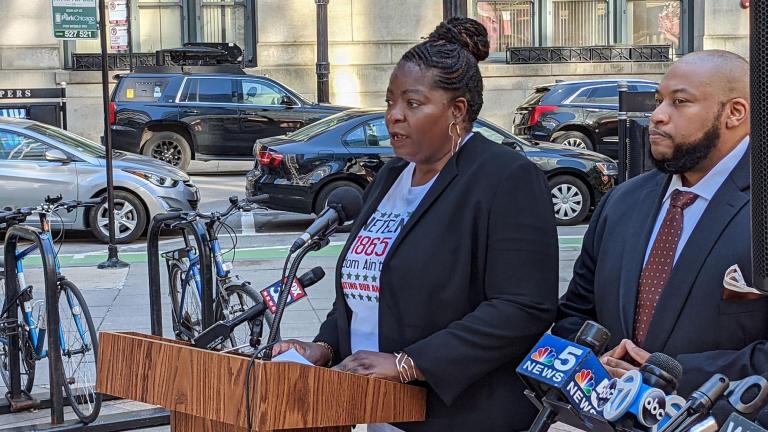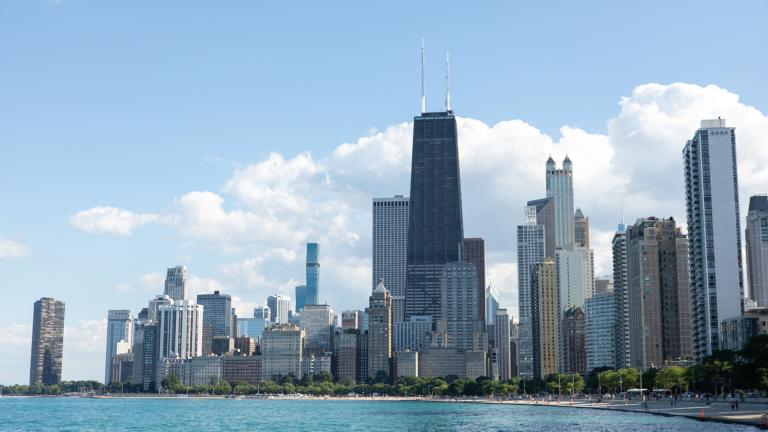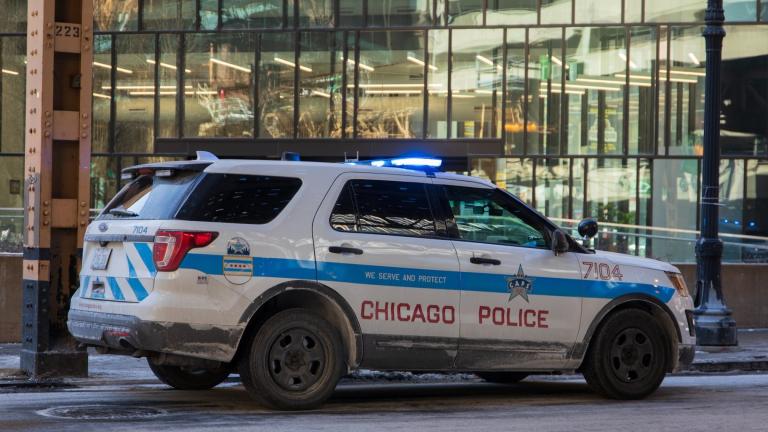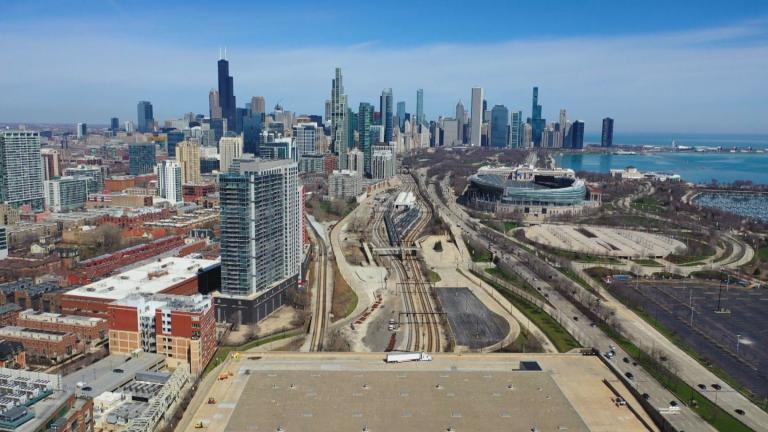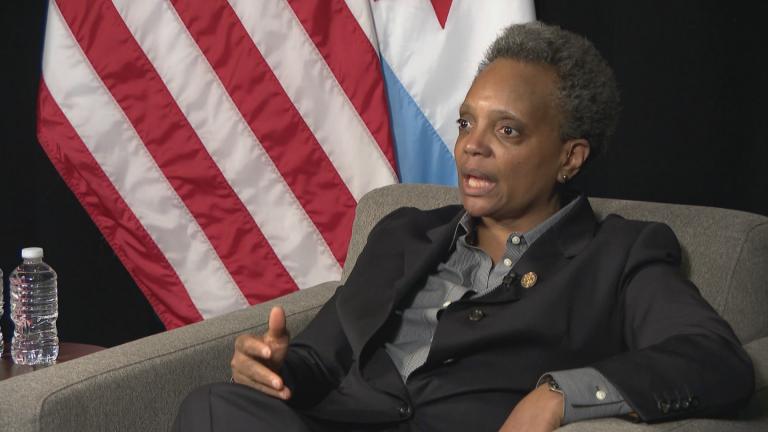The alderperson who brokered the deal that ended the bitter and racially divisive fight over new boundaries for Chicago’s 50 wards wasn’t a grizzled veteran with deep ties to Chicago’s political machine.
Instead, it was Logan Square Ald. Carlos Ramirez Rosa (35th Ward), the first member of the Chicago chapter of the Democratic Socialists of America to be elected to the Chicago City Council, who solved the puzzle and averted a referendum that could have “fanned the flames of racial division.”
The resolution of the monthslong brawl over the ward map is just the most recent sign that the election of six socialists to the City Council in 2019 fundamentally shifted the balance of political power in Chicago. That newfound influence ups the ante as leaders work to expand the City Council’s Democratic Socialist Caucus and consolidate its force at City Hall through the 2023 elections.
“This is an extremely high-stakes year,” said Sean Estelle, campaigns coordinator for the Chicago chapter of the Democratic Socialists of America, known as DSA. “That comes with growing pains — and opportunities.”
The February 2023 election represents a nearly unprecedented opportunity for Democratic Socialists to not only take on Mayor Lori Lightfoot — who already faces seven challengers, with undoubtedly more to come — but also to remake the Chicago City Council after a wave of retirements and departures.
Ramirez Rosa said he was confident that the caucus he leads will be bigger in 2023, as progressive groups mature and seize more power than at any time since the era of former Mayor Harold Washington.
“There is a progressive and liberal majority in Chicago,” Ramirez Rosa said. “The electorate wants change.”
There are more Democratic Socialists on Chicago’s City Council than anywhere else in the United States.
In a sign of the growing electoral clout of Chicago’s DSA, the Cook County Board of Commissioners is set to welcome its first Chicago DSA member after November’s general election. Anthony Quezada, the Democratic Party’s 35th Ward committeeperson, won the Democratic nomination in the race for county board’s 8th District, unseating Commissioner Luis Arroyo, Jr., who has deep ties to the political machine. If elected, Quezada will be the first openly gay Latino Cook County board member.
Quezada, 26, serves as Ramirez Rosa’s neighborhood service director, and was part of a slate of progressive candidates backed by United Working Families, a political organization closely aligned with the Chicago Teachers Union, and other progressive groups that won decisive victories in the June primary.
Limited Endorsements
The effort to elect more Democratic Socialists to the City Council got underway in earnest in August, six months before voters head to the polls, with the first City Council endorsements from Chicago’s DSA chapter, which leaders said has more than 3,000 members.
Those endorsements included Ramirez-Rosa, Ald. Daniel La Spata (1st Ward), Ald. Jeanette Taylor (20th Ward) and Ald. Rossana Rodriguez-Sanchez (33rd Ward), all members of Chicago’s DSA chapter who were endorsed by the group in 2019. Both LaSpata and Rodriguez-Sanchez have already drawn challengers.
All four have consistently championed efforts to decrease the police department’s budget in order to strengthen the city’s social safety net, increase oversight of the beleaguered Chicago Police Department and fight gentrification. That has put them on a collision course most of the time with Lightfoot, who has frequently criticized and clashed with the members of the City Council’s Socialist Caucus.
The group also endorsed Nick Ward, a community organizer, who said he waited tables while performing in artistic productions around Chicago, to replace retiring North Side Ald. Harry Osterman (48th Ward).
A quarter of the entire city is set for new City Council leadership as of Friday, including the North Side Lakefront between Edgewater and Lincoln Park — and that represents a once-in-a-generation opportunity to expand the Socialists Caucus, Estelle said.
But that list of endorsements was also notable for the only member of the caucus it left off: Pilsen Ald. Byron Sigcho-Lopez (25th Ward).
One of the most voluble critics of Lightfoot, Sigcho Lopez opposed efforts to build a casino along the Chicago river in his ward — and got into a screaming match with Lightfoot during the debate after he called the process a “sham” designed to generate contributions for her re-election campaign.
Sigcho-Lopez said he was “surprised that I was not given the opportunity to talk with the full membership after a positive endorsement session” with the DSA’s electoral working group.
DSA members will consider endorsing Sigcho-Lopez at a future meeting, Estelle said.
“Democracy can get messy,” Estelle said. “Sometimes, some decisions take longer than others.”
Two candidates have already launched efforts to unseat Sigcho-Lopez: educator Aida Flores and firefighter paramedic Daniel Montes Talledos.
The sixth City Council member who also belongs to Chicago’s DSA chapter is Lincoln Square Ald. Andre Vasquez (40th Ward) — but Vasquez said he will not seek the group’s endorsement, and is not a member of the City Council’s Socialist Caucus.
Vasquez was censured by the group after he voted for Lightfoot’s 2021 spending plan, which included a $94 million property tax hike that passed with just two votes to spare.
The mayor has steadfastly resisted calls from the Socialist and Progressive caucuses to significantly reduce the $1.9 billion budget for the Chicago Police Department in the wake of the police murder of George Floyd and increase funding for people struggling amid the COVID-19 pandemic.
In the first round of voting in the 2019 campaign, Vasquez defeated fellow DSA member Ugo Okere — the group’s initial pick to unseat longtime Ald. Patrick O’Connor — to reach an April runoff against O'Connor. Maggie O’Keefe, the fourth-place finisher in the first round of voting, is now the Democratic Party’s 40th Ward committeeperson. O'Keefe said she will not run against Vasquez in 2023.
While any candidate can take the Chicago DSA’s endorsement questionnaire, the group will not endorse in every race where a Democratic Socialist is running to ensure the group is using its resources wisely, Estelle said.
“We want to ensure that any candidate we endorse has the full support of the chapter through a democratic process,” Estelle said. “Sometimes we don’t reach complete consensus.”
At least three other candidates for City Council have asked Chicago’s DSA for its endorsement: Uptown resident Angela Clay, who is running to represent the 46th Ward, West Ridge resident Mueze Bawany, who is running to unseat Ald. Debra Silverstein (50th Ward) and Oscar Sanchez, a resident of the Southeast Side who is running for 10th Ward alderperson.
Ald. James Cappleman (46th Ward) and Ald. Susan Sadlowski Garza (10th Ward) are not running for re-election.
The victory of state Rep. Delia Ramirez, D-Chicago, in the Democratic primary to represent the 3rd Congressional District could provide a template for progressive candidates looking to defeat Lightfoot or moderate candidates for the City Council.
Ramirez won approximately 66% of the vote in that race, despite facing a barrage of attacks from opponents and outside groups for calling for the Chicago Police Department to be defunded during the summer of 2020 in the wake of the police murder of George Floyd.
Ramirez’ victory has convinced progressive leaders that candidates with clear platforms can win tough races as long as they have committed volunteers — and the unified backing of organizations like Chicago’s DSA, the teachers’ union and United Working Families.
Unfinished Business
If the Socialist Caucus does expand after the 2023 elections, it will have a long list of unrealized policy goals to advance, including efforts to give a newly launched Chicago Police oversight board the power to hire and fire the top cop. That would require a change in state law, or the voters’ approval of a binding ballot measure.
While the Socialist Caucus helped push the City Council to adopt a measures designed to prevent longtime residents of Woodlawn from being displaced by the under-construction Obama Presidential Center and to stop gentrification in Pilsen and along the 606 trail.
Those programs do not go far enough in addressing Chicago’s affordable housing crisis, and city officials have not done enough for Chicagoans who have nowhere to live.
In addition, Lightfoot has refused to reopen the mental health clinics closed by former Mayor Rahm Emanuel as demanded by nearly all of the progressive members of the City Council. Instead, Lightfoot has expanded city funding for nonprofit organizations.
Progressive members of the City Council have also demanded that Lightfoot quickly expand programs that send social workers and paramedics to help Chicagoans who call 911 while experiencing a mental health crisis. So far, Lightfoot has only endorsed testing that system in a small portion of the city.
For years, the holy grail of the progressive movement has been to impose higher taxes on large corporations in Chicago as well as a tax on financial services transactions to generate millions of dollars to fund social programs.
Ramirez Rosa said that goal is in sight.
“This is a movement fighting to transform our city,” Ramirez Rosa said. “We are taking a new approach to how we govern as progressives.”
Contact Heather Cherone: @HeatherCherone | (773) 569-1863 | [email protected]

